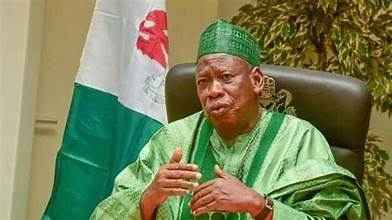Dr. Abdullahi Ganduje, the National Chairman of the All Progressives Congress (APC), has publicly endorsed the leadership of the party’s United Kingdom chapter under Hon. Tunde Doherty, declaring them the legitimate representatives of the APC in the UK committed to advancing the party’s interests abroad.
This affirmation from Ganduje comes in response to circulating rumors suggesting that the APC’s diaspora chapters lack formal recognition in the party’s constitution.
During a meeting with the APC UK executive members, Ganduje emphasized that the only genuine representatives of the APC in the UK and the wider diaspora are those led by Doherty. He firmly stated that no amount of misinformation or intimidation could undermine the decisions made by the national leadership of the party.
He congratulated the newly elected officials of the APC UK executive for successfully completing their party congress, which was overseen by the party’s National Secretary, Senator Dr. Ajibola Basiru. Ganduje highlighted the national party’s unwavering support for the UK chapter.
In praising the newly elected leaders, he remarked on their dedication and seriousness, noting that they embody the party’s vision and are committed to its advancement.

Ganduje also reassured the APC UK leadership that they would be provided with significant opportunities to engage in party and government affairs, reiterating the importance of their contributions to the party’s progress.
“This is the legitimate representative of the APC in the UK. I am aware of your commitment to our party’s advancement, and I want to assure you of the national leadership’s backing,” he stated.
He referenced the successful congress, which serves as a testament to their commitment to the party’s growth. “While it is not uncommon for some individuals to question the legality and authenticity of the new executive committee, let me assure you that legal challenges are a typical part of political life. Therefore, you must stay focused on your mission to promote our party’s ideology in the UK.”




